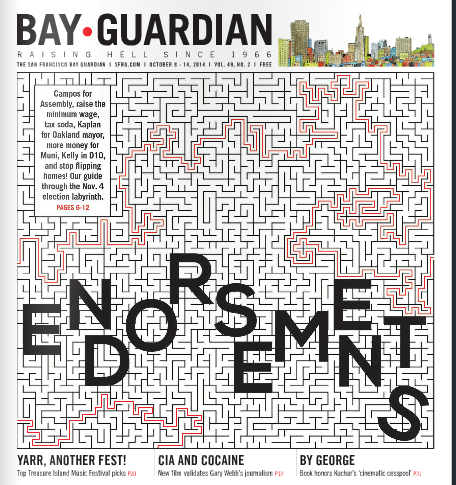
By Tim Redmond
OCTOBER 16, 2014 – The owners of the Bay Guardian, who shut the paper down Monday, have at least gotten one message: It’s not okay to take offline the website and digital archive of the paper.’
After going down for two days, sfbg.com was live late this afternoon. So the years and years of back stories can once again be found, the former staff have a chance to link to their work if they want to apply for jobs, and the links many other publications have used to connect to Guardian stories will once again be live.
I wonder how long that will last.
When the Boston Phoenix shut down in 2013, its website stayed live; it’s kind of a moment frozen in time, the story about the paper closing on the front page. Can’t cost much to keep the site up, maybe a few hundred bucks a year. The value is incalculable.
I will say from the outset: I know nothing about the finances of the SF Media Co, which owned the Guardian and still publishes the Examiner and SF Weekly. But it’s no secret that the SF Chronicle is losing money and looking for a buyer, and maybe the Examiner is in the same situation. I can’t imagine that the paper, which is very thin and has only a few major advertisers, is doing well.
And SF Weekly? Last I heard, which was a while ago, that paper was above water. But it’s a weekly, and it’s not exactly fat either; is it making enough to keep the whole SF Media Co viable? Not likely.
So there may be a point in the not-too-distant future where the whole enterprise folds – and then what happens to all of that history?
The Examiner donated some of its archives years ago to Bancroft Library at UC Berkeley. But (as we have just noticed) things go bad when paper close down quickly. And newspapers, much as they may be (sadly) yesterday’s news, are still yesterday’s news: They were, and are, the first draft of history, and their pages contain priceless information.
Nicholson Baker spent all of his retirement money trying to save old newspaper archives, and has created a foundation to preserve them. It’s insane that one writer has to do that. The National Archives ought to offer to take over, index, and preserve the amazing US history that is in the pages of daily newspapers that may not survive the next decade.
But when I talked to Pat Brown, the general manager of the SF Media Co, Monday, he told me that the archives have “value.” I hope that doesn’t mean the company wants to, in effect, hold hostage the history of progressive San Francisco until somebody coughs up a bunch of money.
When I started in this biz, the good people (and there were many) who ran newspapers understood that they were operating under a sacred trust. The First Amendment gave us vast power – but with it came the responsibility to understand that this was a business, but not just a business. It was a critical part of American history and democracy.
As the daily newspaper business declines, we have to remember that. What the papers produced, in print and online, is not just private property; it’s something that everyone in this country has a stake in.
Some libraries have copies of local newspapers. The SF Public Library has old Guardians on microfilm. That treasure trove ought to be digitized; so should all the other microfilm news archives (hey – here’s a great project for some tech mogul to fund!)
As for the Guardian:
I was sitting around with my son the other night, and now that he’s 15, I figured it was okay to share with him the story I wrote about him when he was three years old. We pulled it up on his phone, and (despite the inappropro drug reference) we had a great moment reading it. It mattered to both of us.
This stuff can’t go away. It can’t be the victim of the strange economics of newspaper capitalism in 2014.
Shutting a newspaper isn’t like closing a shoe store. There’s too much history – and while it may belong legally to the owners, it really belongs to the public. When I was at the Guardian, the archives were open to anyone who wanted to come by the office and look through them. Journalists, historians, researchers – lots of folks wanted to find some article from the 1970s, and I made it a point to help them.
With everything in the business so shaky now, the SF Media Co. ought to give that history to someone who can preserve it. The website can easily be hosted at a university (USF or Berkeley would I’m sure be willing to do it). The print archives, too.
I emailed Brown today to ask if he was willing to donate the archives to someone who would preserve them, and he didn’t respond. Hope that’s not a bad sign.






